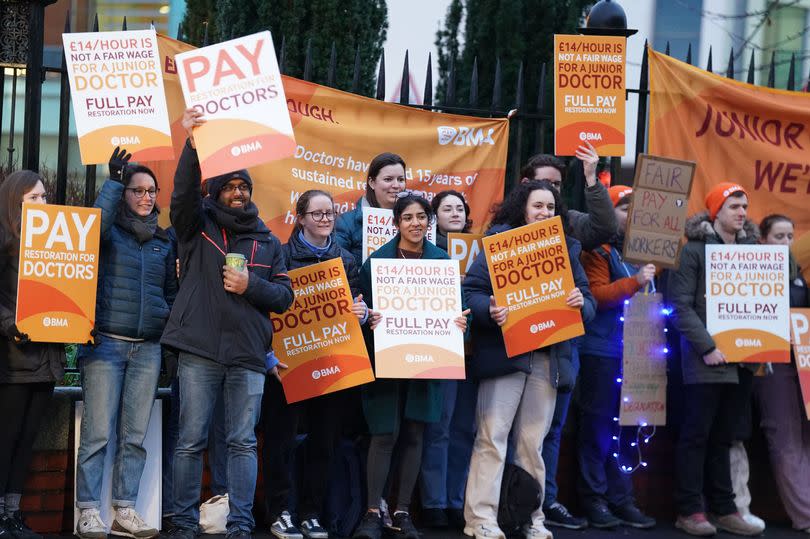NHS expecting 'major disruption' due to heatwave and junior doctors' strike, health bosses warn

The NHS is expecting "major disruption" because of the heatwave and junior doctors' strike, health leaders have said.
Yellow heat health alerts are in place for many parts of the country and will end at 5pm on Thursday, June 27, the day junior doctors will go on strike. It will be the eleventh walkout by junior doctors from the British Medical Association (BMA) in England, as the bitter dispute over pay rumbles on.
While the weather will become more inclement during the five-day strike, NHS bosses said that the current heatwave has already put strain on the service. And concerns have been raised about the impact the action will have on hospitals affected by a cyber attack.
Major hospitals Guys' and St Thomas' and King's in London are still running at reduced capacity after the incident. But the BMA announced that some doctors would be given permission to work at the hospitals during the walkouts to "prevent dangerous delays to cancer care".
BMA chairman of council, Professor Philip Banfield, said: "When the junior doctors go on strike, it doesn't empty the hospital out of doctors, you re-provide what junior doctors are doing with more experienced doctors. So you've got our SAS colleagues, consultants, so it is a more senior workforce in place, those gaps are not quite what you would expect.
"The cyber attack, they (the hospitals) are not able to do as much of the elective work anyway - that's going across a six-week period. So if you put a strike on to that, they've already got a mechanism for doing the work that they can cope with.
"In any heatwave warning, if you end up going to emergency departments because of heat, you will be treated as you would on any normal day, you don't suddenly end up bringing in lots of doctors. If any (hospital) finds that there is a cluster of incidents that need doctors to go back into work, then the junior doctors will go back into work.
"So for example, if there was something big that happened at an event like Glastonbury and ended up with tonnes of people being admitted to the hospital, what does the NHS England do? It comes and tells us what the situation is, and we say 'fair, you need two people to go back'."
NHS England said that it expects the strike to cause "widespread disruption to routine care and difficulties with discharging patients", despite extensive preparations. Junior doctors make up half of the medical workforce and their last walkout in February led to 91,048 appointments, procedures and operations being cancelled.
The strike starts at 9am on June 27 and ends on July 2, just two days before voters go to the polls. NHS England's national medical director, Professor Sir Stephen Powis, said: "This new round of strike action will again hit the NHS very hard, with almost all routine care likely to be affected, and services put under significant pressure.
"While the warmer weather can lead to additional pressure on services at a time when demand for services is already high. As ever, we are working to ensure urgent and emergency care is prioritised for patients, but there is no doubt that it becomes harder each time to bring routine services back on track following strikes, and the cumulative effect for patients, staff and the NHS as a whole is enormous.
"People should continue to use 999 in life-threatening emergencies and NHS 111 - on the NHS app, online, or by phone - for other health concerns. GP services and pharmacies are also available for patients and can be accessed in the normal way, and patients who haven't been contacted or informed that their planned appointment has been postponed are also urged to attend as normal."
Junior doctors have said that they will call off the strike if Prime Minister Rishi Sunak makes a credible commitment to restore their pay. The BMA has said that junior doctors' pay has been cut by more than a quarter since 2008.
Matthew Taylor, chief executive of the NHS Confederation, said: "While we fully understand the genuine grievances junior doctors have over their pay, conditions and training, NHS leaders will still be frustrated that they will yet again be taking to the picket lines. Holding strikes in the middle of an election campaign when no political party is in a position to bring the dispute to a close is a bitter pill to swallow for staff who have to plug the gaps and patients who will have their appointments cancelled or delayed.
"The BMA should also explain what allowances they will be making for organisations and patients affected by the recent serious cyber attacks. With both main parties pledging to restart negotiations immediately upon forming a new government, there is no reason for these strikes to go ahead. We would urge the BMA to wait for a new government to be formed and try to find a compromise."

 Yahoo News
Yahoo News 
